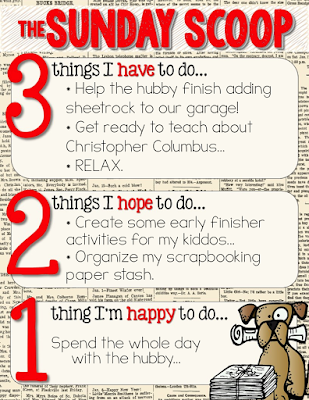
The Favorite Things Linky is a great way to share your 3 favorite anythings! Grab the template and button and link up below! If this is your first time linking up,
check out our Favorite Things page for more details!
Be Prepared!
In fact, be OVER prepared. An unprepared teacher on Parent Conference Night is likely to have difficult conferences.
You HAVE to be prepared or parents will not respect what you are telling them about their child. They will doubt that you have it "altogether", and they are actually right. The lines for communication will most likely be cut off before they even have a chance to form.
Unpreparedness also communicates to parents that you are unprofessional. It shines the light on your inefficiency. It suggests that you don't value their student because you couldn't be bothered to prepare for their visit.
Do you need to tell a parent that their child is struggling? Parents need to see proof. Print out any testing data and highlight what is important for the parent to understand. Also share with parents what you expect from a typical student and what you are hoping to see at the end of the school year. Share samples of an average student's work alongside their student's work. Have samples of grade level work on hand for parents to view. Parents need to see how much their child need to grow this school year. Save student work or have copies available for the parents to review. Most importantly, write up a summary of what is going to be discussed. This helps to keep you on track and gives you something the parents can sign, thus, giving you tangible proof of what took place during your meeting.
You are busy, and parents are busy. No one has time to sit and wait for an unprepared teacher to round up information on a student.
Always start positive!
I know you are probably thinking, "Uh...duh," but it actually needs to be said. Every parent needs to hear that their child is valued. They need to hear that you care for their child. The best way to communicate this is to say something positive about their student. But, sometimes it is really, REALLY difficult to find something favorable to say about the kiddo that has been making your class miserable. But you HAVE to. Bombarding parents with the negative right off the bat will only cause them to shut down and tune you out. The message you are trying to communicate will be lost.
Here are some examples of some positive statements:
I love the way John enters the classroom ready to go. (Translated: has lots of energy)
Lori is so sweat and loves to help in the classroom. (Translated: nothing academic to praise)
No one sharpens pencils like Hector! (Translated: Anything, and I mean anything, goes!)
Seth always volunteers to run errands for me. (Translated: can't stay in his seat)
I can always count on Lucy to help me remind others of the classroom rules. (Translated: tattling)
Here is a great link to a Scholastic article on report card comments that can also be helpful for conferences:
101 Report Card Comments.
You are on the same side!
It is so important to demonstrate to all of your parents that you are on the same side- the side of the child. They need to know that they are not alone, and that you are a team. Let them know that you need to work together. This is important because parent support can make all the difference in a struggling student's growth. Go as far as actually verbalizing that you are a team working together for the sake of the child.
Another way to show the parent that you are allies is to make sure that you sit next to them and not across from them in a "teacher" seat. This puts a barrier between you and that barrier can translate to, "I am on this side and you are on that one."
Most importantly, listen to the parents. They have valuable information. Be open to their knowledge of their own child. Parents were there before you and will still be there when the child leaves your classroom. As the teacher, you have important information for the parents. But this is a two way street- they have meaningful information for you as well.
Go into the conference with the view that the conference as an information exchangeinstead of just a flow from you to the parent.
What tips do you have for parent conferences?




















